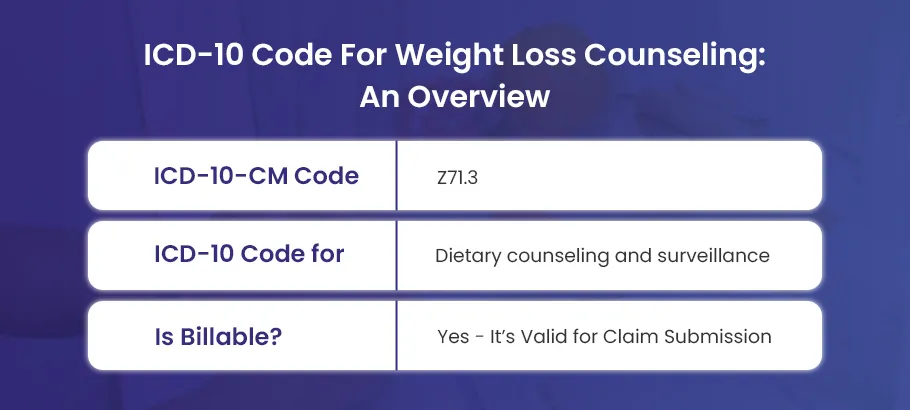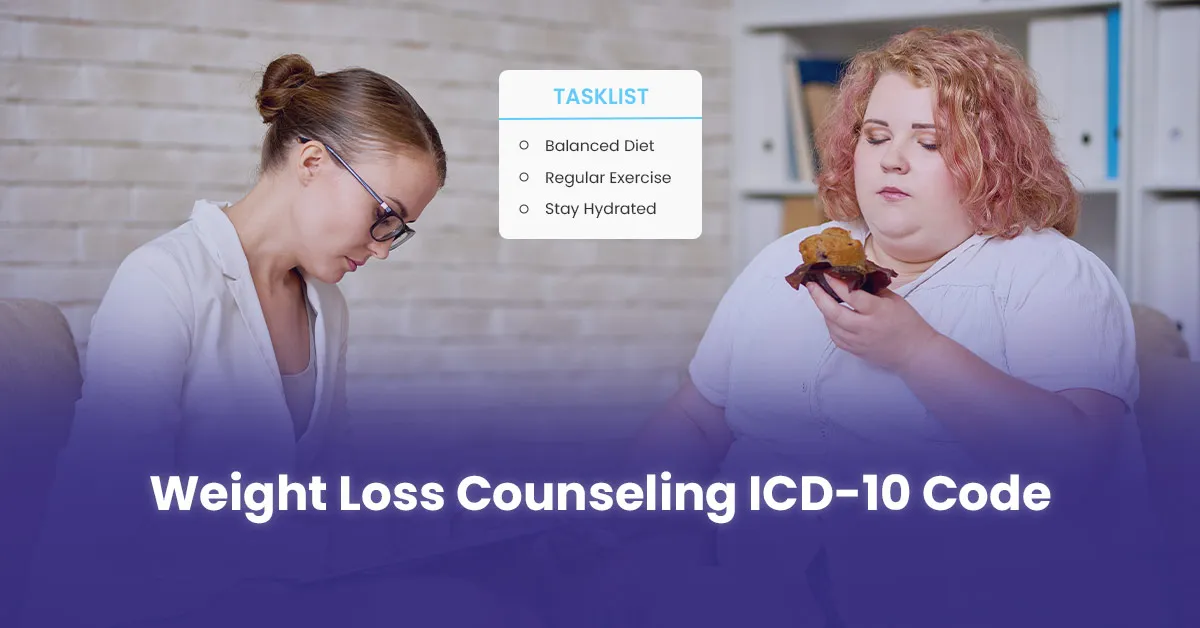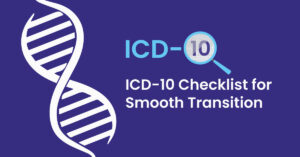In the US, obesity is a major problem that has big effects on people’s health and on the whole healthcare system. Therefore, it is important to deal with obesity and the risks that come with it.
A good weight loss counselling service can help with this problem. And ICD 10 weight loss counseling codes numbers are used to report these services.
But what are ICD 10 weight loss counseling codes?
This article gives you an overview of the ICD-10 codes that are often used for weight loss counseling.
ICD-10 Code For Weight Loss Counseling
Z71.3 is a supplementary diagnosis ICD-10 code that is used to specify the medical diagnosis of dietary counseling for weight loss listed by World Health Organization (WHO). It is billable ICD code used by medical coders to report the provision of dietary advice and monitoring services to patients who are indulged in losing their weight. This code is valid from October 1, 2023 till September 30, 2024 🔗 basically for the submission of HIPAA-covered transactions.

| ICD-10-CM Code | Z71.3 |
| Used for: | Dietary counseling and surveillance |
| Is Billable? | Yes – It’s valid for claim submission |
POA Exemption For Z71.3
Weight loss counseling ICD-10 code does not need to be reported as Present on Admission (POA). This means that the healthcare providers are not supposed to mention the requirement of dietary counseling and surveillance that was present at the time when the patient was admitted.
Present on Admission (POA) is a medical term that refers to a patient’s condition at the time of admission to a healthcare facility. Medical workers can use this important sign to figure out if a health problem existed before the patient came to the hospital or if it got worse during their stay. POA helps with the proper care of patients and makes sure they get the right care.
For example, a patient who is admitted to the hospital with a fatty liver might not need both diet and weight loss guidance at the same time. But once a patient is stable, their doctor may decide that dietary guidance is needed to help them deal with the risks that come with having a fatty liver. Medical coders could use Z71.3 to report counseling on diet and weight loss in this case.
CMS has defined different POA indicators to clearly mention the status of diagnoses during patients admission. These indicators impact how a diagnosis impacts the reimbursement rate under the Diagnostic Related Group (DRG) system.
| POA Indicator | Reason for Coding | Impact on DRG Reimbursement |
| Y | Diagnosis was present at the time of inpatient admission | ✔️ YES |
| N | Diagnosis will not be considered for DRG reimbursement | ❌ NO |
| U | Insufficient to make analysis whether the condition was present at admission | ❌ NO |
| W | Clinically not determined whether the condition was present at admission | ✔️ YES |
| 1 | Code isn’t applicable for POA reporting as it is exempt | ❌ NO |
It’s not necessary to report POAs for code Z71.3, which doesn’t change the DRG rating or the reimbursement process for in-patient care.

Do You Know The ICD-10 Code Used For Abnormal Weight Loss?
ICD-10 code R63.4 is used to describe weight loss that isn’t normal and can’t be explained. This disease is marked by a significant drop in body weight that happens on its own, without any diets or other physical activities. If you lose more than 5% of your body weight in 6 to 12 months for no reason, that’s called abnormal weight loss.
So, if someone who weighs almost 150 pounds loses 8 to 9 pounds over the course of a few months without meaning to, this could be classed as R63.4.
██▓▒░⡷⠂𝙵𝙰𝚀𝚜⠐⢾░▒▓██
Can code Z71.3 be used with other nutrition-related codes?
Yes, Z71.3 can be paired with other ICD codes as needed. For example, if a patient with iron deficiency anemia (D64.9) is receiving weight loss counseling, both D64.9 and Z71.3 would be applicable. The Z71.3 depicts the counseling itself.
Is Z71.3 appropriate for weight management programs?
Yes, Z71.3 is the right code for patients actively engaged in a weight loss program, whether commercial, medical, or self-directed. The code covers the counseling and surveillance piece. Proper documentation of the dietary counseling is key for accurate coding.
Could new codes emerge for weight loss counseling?
Potentially. As healthcare continues to progress, new codes may be introduced to capture evolving trends in weight loss counseling approaches. The codes aim to provide specificity around the exact nature of counseling.
How can providers ensure accurate coding for weight loss counseling?
To ensure accurate coding for weight loss counseling, providers should take the following steps:
1). Educate coders on the specific ICD-10 diagnoses related to overweight, obesity, and weight loss that apply to the patients they serve. Provide clear guidelines on selecting codes based on BMI, comorbid conditions, and documentation in the medical record. Offer regular refreshers on coding for weight management, as this is an evolving area.
2). Have coders submit reports on the ICD-10 codes used for weight loss counseling, along with the rationale for code choice. Review these reports to confirm the appropriate codes are being applied in each case. Follow up with additional training if certain codes seem over or under utilized.
3). Develop a checklist of elements physicians should include in their documentation to support accurate coding. This may include BMI, obesity class, discussion of dietary changes, exercise plans, and goals for weight reduction. Encourage complete documentation.
4). Consider having an experienced coder or auditor periodically evaluate a sample of records coded for weight loss counseling. Look for accuracy and completeness. Provide feedback to coders to improve their selection of codes.
5). Stay up to date on any changes to coding guidelines for weight management and obesity treatment. Update policies, procedures, and education accordingly. Proper coding ensures fair reimbursement for clinically appropriate weight loss counseling services. With regular auditing and training, providers can confidently code these services.
Let BellMedEx Help You with ICD-10 Coding for Weight Loss Counseling Encounters
As a full service medical billing and coding company, BellMedEx makes ICD-10 coding for weight loss counseling much easier. Our CPC and CCS medical coders have the skills and knowledge to help you correctly report patient encounters, choose the right ICD code, and make medical bills.
BellMedEx has made my job as a practice owner much easier.

Dr. Julia
Counselor, Psychiatric Clinic

Top Features
✓ Medical Billing
✓ Medical Coding
✓ Revenue Cycle Management




